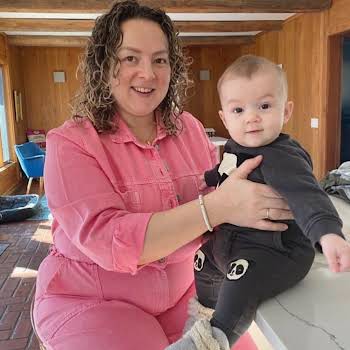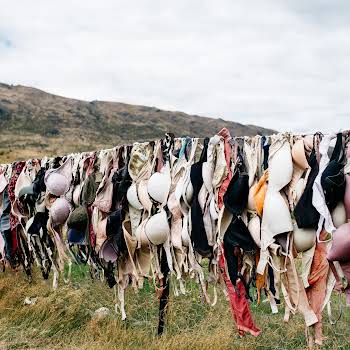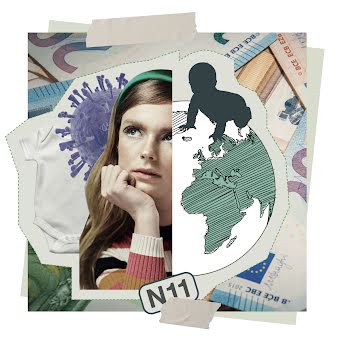
Sweating under scarves or guilt-weary with the bottle: Why breast or bottle feeding your baby feels like a lose-lose
By Amanda Cassidy
04th Oct 2021
04th Oct 2021
This week is National Breastfeeding Awareness Week and to mark it, Amanda Cassidy wonders at the stranglehold large corporations have on some of our more intimate parts of parenthood – including breastfeeding
Put down your parenting pitchforks. We know we all want the best for our baby. We know fed is best, we know you have been up all night, and we admit that we all feel touchy when it comes to motherhood and our methods.
“I’m not sure I’m doing it right” is the mantra I’ve repeated in my head a million times since I had my three children.
Every choice I make, I question. Any choice that I make that is questioned by someone else makes me borderline violent. It is born out of insecurity. Becoming someone’s mama is a game-changer, and nobody ever gave us the rulebook. Hell, we didn’t even realise we were playing. It’s feeling your way in the dark, but not really knowing where you are going in the first place. Welcome to motherhood.
And it’s the smuggest of us that are often the most insecure. Sleep deprivation doesn’t help, it fans the flames of our uncertainty. We’ve been handed tiny helpless creatures to keep alive – that’s some responsibility. We are overwhelmed, unsure and oh-so-tired. We back the choices we make out of the desire to do right by our children. We snap on social media when we feel cornered by our peers. We jump on our soapbox to proclaim our way is the best way because it is working for us. We have become very good at making ourselves feel simply awful about our choices.
Lactivism
So here’s what we can’t dispute. We know that breastfeeding and formula feeding are not the same thing. We also know that breast milk is best. We know that formula milk also has its benefits too. But the problem is that the debate has been hijacked by a third party – the infant formula industry – which is worth billions and they are distorting the conversation to suit their own agenda.
Bad mother, you didn’t even try. That type of refrain is annoying, unnecessary, and mentally exhausting.
However, it may not be the only villain in this story. Campaigns to encourage women to breastfeed have the tendency to turn militant. People don’t just breastfeed – they “believe” in breastfeeding. Tying to encourage others to realise why it is so beneficial turns from informing into lecturing, from encouraging to wagging their fingers. Bad mother, you didn’t even try. That type of refrain is annoying, unnecessary, and mentally exhausting. Truthfully, you must decide what is best for you, because you can’t be a good parent without first taking care of yourself. But the scale of the mass manipulation of the infant formula corporations is staggering.
Of course, it is an important industry that provides highly nutritious milk-substitute for those who choose to formula feed for a variety of reasons. But the problem is that not every decision that is being made is in the customer’s best interests (Remember, customer = your baby). And for something as important as feeding your tiny infant, it merits double-checking the motives when it comes to the lobbying of our leaders. If any of you have listened to the recent You’re Wrong About podcast on the history of bottle feeding, titled “The Great Protein Fiasco”, you’ll know what I’m referring to. And if not, it’s well worth a listen here.
Milking it
In fact, the lobbyists for this industry are so powerful that a 2018 gathering of World Health officials almost turned into a diplomatic conflict. In a shock move, the US threatened to pull military aid to Ecuador because it proposed an international resolution that encourages breastfeeding. The move surprised hundreds of delegates at the UN-affiliated World Health Assembly. According to the New York Times, American officials opposed a widely popular resolution to promote breastfeeding – specifically they pushed to remove language asking governments to “protect, promote and support breastfeeding”.
"Making it into a breastfeeding versus formula feeding debate plays into the commercialisation of baby nutrition".
Fearing the consequences for initiating the proposal, Ecuador backed down – along with a number of other countries, afraid of the wrath of the US. Luckily, the resolution ultimately made its way through because the Russian’s refused to be bullied into submission. According to the New York Times, one Russian delegate explained; “We feel that it is wrong when a big country tries to push around some very small countries, especially on an issue that is really important to the rest of the world”.
When contacted about the threats made by the US, Caitlin Oakley, from the Department of Health and Human Services said that the initial version “placed unnecessary hurdles for mothers seeking to provide nutrition for their children”. She continued, ‘The US was fighting to protect women’s abilities to make the best choices for the nutrition of their babies. Many women are not able to breastfeed for a variety of reasons, these women should not be stigmatized; they should be equally supported”.
Commercial pressures
Let’s ponder this for a bit. Nobody is denying access to formula for women who choose not to breastfeed. Making it into a breastfeeding versus formula feeding debate plays into the commercialisation of baby nutrition. Let’s also not forget that then-US President Donald Trump has referred to breastfeeding as ‘disgusting’ more than once. In 2011, he called a lawyer “disgusting” when she requested a break to pump milk for her 3-month-old daughter. In 2012, he tweeted about the front cover of a TIME magazine showing a woman nursing her toddler saying ‘The TIME magazine cover showing late age breastfeeding is disgusting – sad what TIME did to get noticed.”
I skulked in back rooms to avoid embarrassed relatives, I sweated under scarves as a frustrated baby yanked my sore nipples, and I sat in bliss watching her sweet nuzzle thinking it was truly a beautiful thing.
But this isn’t an anti-Trump rant, it’s just an example of whole governments are becoming increasingly vulnerable to commercial pressures when it comes to human decisions. Siding with corporate interests, in this case the billion-dollar infant formula industry, is becoming commonplace, and if we’re not aware of the lobbying groups at work, it can be difficult to see the wood from the trees
We all want the best
We are all smart women who want the best for our babies. I know the struggle of both. I breastfed my first daughter. I winced, I struggled with the latch, I watched her grow healthy and strong with the milk I produced. I was proud that I managed to feed her myself, despite the feelings of exposure, despite my friends’ formula feeding, and despite the judgement, I felt from many (mostly older) women who all had an opinion. I skulked in back rooms to avoid embarrassed relatives, I sweated under scarves as a frustrated baby yanked my sore nipples, and I sat in bliss watching her sweet nuzzle thinking it was truly a beautiful thing.
When my son was born (15 months after his sister) via c-section, I exhausted myself trying to recreate the same experience. I cried out my hormones and then cried some more. My son, frantic with hunger, sought out milk that just wasn’t there. During one particularly tough night, I asked myself why I was putting us both through this ordeal when I could just pick up some formula. He was still going to grow healthy.
I felt bad that he wouldn’t get the same levels of goodness that nothing but nature can provide, but not bad enough that I was prepared to risk my mental health or his well-being. It all worked out and he’s a happy, healthy, formula-fed baby. At the time, I glossed over the ranty posts about “breast being best”. I was confident with my choice – I knew what I was doing and the reasons why were personal to me. I returned to breastfeeding on my third child. In fact, I fed her for much longer this time around and found it a much more enjoyable experience.
I have experienced the entire spectrum of this debate. I understand the challenges, the benefits, the pain, the joy and the convenience of both feeding your baby yourself and using formula to keep them healthy. So why are we wasting our time squabbling over which is better, when we shouldn’t be taking our eye off an industry which, as great as their product is, has an ulterior motive when it comes to pushing its wares.
The Mommy Market
We are being targeted, our emotions are being played and our insecurities used against us – even from the very moment we decide to create life, An Australian study found that there was a conflict of interest when it came to fertility clinics operating as a commercial business. The research, published by Human Fertility, found evidence that women may be given false hope and continue IVF treatment, despite success being unlikely.
Of course, that doesn’t happen everywhere, but we have to remind ourselves that as mothers, we are a very desirable and financially lucrative demographic for big corporations. They know that we will do whatever it takes to make our child happier, healthier, stronger, more intelligent and safer.
That's not to say that more support shouldn't be offered to those who formula feed their children - but it should come from a place that is free from commercial gain.
In recent years, fewer of us in wealthier countries like Ireland are buying formula for our children. Instead, most of the formula industry’s growth is coming from developing nations like Ecuador. That’s why so much pressure was put on it by the US delegates who likely were, in turn, pressured by the infant-formula lobbyists. We know that’s the way of the world, but we need to open our eyes to how it is affecting us day to day, during a time when we may not be fully ourselves.
Nobody wants to be made to feel bad, but we can’t let corporations dictate what is and isn’t best for our children. Formula is a convenient substitute for our own milk, but it is obvious that governments have to prioritise breastfeeding over formula feeding when it comes to its guidelines. That’s not to say that more support shouldn’t be offered to those who formula feed their children – but it should come from a place that is free from commercial gain. We need to leave behind the snide remarks and our defensiveness We’ve more important tasks as mothers – little humans to raise, tiny minds to cultivate and fledging personalities to nurture (all without losing our own minds).
























